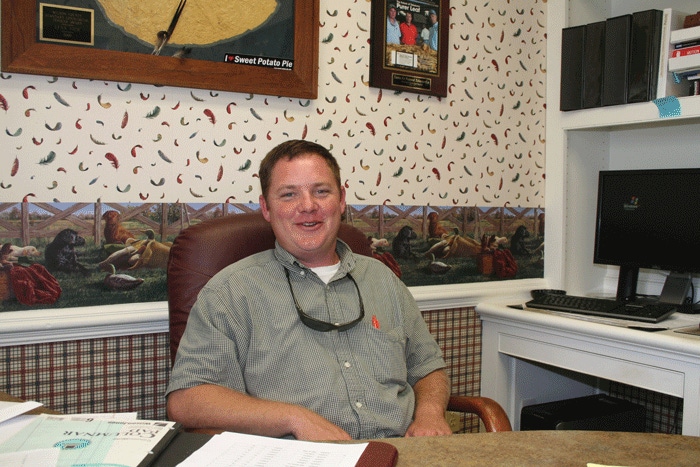January 4, 2013

He’s the quintessential modern day, young farmer: cell phone in one hand, explaining tobacco harvesting instructions in Spanish, and office phone in the other, explaining spraying information for cotton in English.
Hard work, innovation and gritty determination have helped Linwood “Lyn” Vick get where he is today with his family’s farming operation — but having the right gene pool didn’t hurt a bit. In his case, the apple truly didn’t fall far from the tree.
His mother and father, Jerome and Dianne Vick, started the farming operation with 15 acres of land near Wilson, N.C., and headquarters for Vick Family Farms remains near that original farm.
Today, however, the farming operation encompasses more than 6,000 acres.
Over the years, the Vick family name has been associated with the country’s top producers of tobacco and sweet potatoes. In the late 1980s, they added cotton to their farming roster, and have been equally successful growing fiber.
Lyn’s sister, Charlotte, who is still actively involved in the farming operation, made her mark early at Vick Farms as a cotton scout. “I often remind Lyn of how much he didn’t like growing cotton back in those days,” she laughs.
Today, Lyn not only likes growing cotton, he’s very good at it. His achievements in cotton production and his use of environmentally sound practices have earned him recognition as the Farm Press/Cotton Foundation 2013 High Cotton Award winner for the Southeast region.
He and winners from the Delta, Southwest, and Western regions will be honored at a special awards breakfast at the Beltwide Cotton Conferences at San Antonio, Texas.
North Carolina State University Extension Agent Norman Harrell, who nominated Vick for the award, says, “Lyn and his family continually push the edge of technology, and do it in a way that helps them produce both high yielding and high quality cotton crops year after year. The entire family is always open to working with us in any way they can to help us develop meaningful information that could help other farmers.”
The Vicks started out growing conventional cotton in 1987 — back in the era when he didn’t like it so much.
Soil erosion problem
“We had a big problem with soil erosion,” Lyn says. “Early in the growing season especially, our conventional cotton was literally sandblasted by the fine, sandy soils on much of our farm.
“When Roundup Ready cotton came along, we switched to all no-till for cotton, soybeans, double-crop soybeans, and wheat. Our tobacco and sweet potatoes are grown with conventional tillage, so going no-till on cotton and soybeans helped improve the tilth of our soil and helped with erosion problems.”
Much of his cotton is in a four-year rotation with sweet potatoes, tobacco and soybeans. On some land not so well-suited to these crops, he uses a three-year rotation, which sometimes requires back-to-back years of cotton.
Having sweet potatoes and tobacco in their cotton rotation is a bit unusual, but he says it has been a blessing in battling glyphosate-resistant pigweed.
For example, cotton is grown one year, followed by tobacco. “We’re using different chemicals for weed and grass control,” Lyn notes. “Plus, we’re deep plowing and bedding our tobacco land, and in some cases hand hoeing and pulling weeds.
“Thus, we’re able to reduce the seed bank for pigweed. Other than soybeans, we plant wheat on all our land. We’ve found that with a thick cover crop on the land over fall and winter months, we have less weed pressure.
“Even after Roundup Ready cotton came on the market, we continued to use yellow or white herbicides, so we never got the real buildup of pigweed that so many other growers are battling now.
“I remember the long battle we went through to get rid of boll weevils, and now we are facing as big, if not bigger, problems with herbicide-resistant weeds.”
Another advantage of the unusual cotton rotation, Lyn says, is suppression of nematode problems. Most of their tobacco and sweet potato land is treated with Telone and Lorsban, so they are carrying out practices as a part of their normal farming operation that gives a side benefit of reducing nematode populations.
Both sweet potatoes and tobacco are labor-intensive crops, and Vick Farms is a pioneer in using legal, H-2A labor.
“Having adequate labor on hand for these crops can be a big advantage in our cotton operation,” Lyn says. “If we get in a situation where we can’t get in a field with the right herbicide, we can always use some of our labor to clean up those fields.”
Each member of the Vick family speaks Spanish. The farm has 10 full-time employees, and all but two speak Spanish.
Important tool
“It’s a tool that’s important in our farming operation,” he says. “Whether or not I’m fluent in Spanish, I don’t know, but I can explain to any of our H-2A workers what I want them to do and how I want them to do it. Lack of communication should never be an excuse on our farm for not getting things done right.”
Lyn didn’t just grow up on a farm, and he didn’t just grow up working on a farm — he grew up working hard and smart on Vick Family Farms. He graduated from the prestigious North Carolina State Agriculture Institute in 1997, then came back to begin learning the farming business from his parents and with his sister.
He was in charge of fieldwork on the farm, working primarily with cotton and soybeans. Charlotte was scouting cotton for the family farm and for other cotton operations in the area, as well as beginning to take over marketing of family-grown crops.
The learning process was moving along on schedule for Lyn, but in 2002 fate stepped in and his learning curve became much steeper.
During a trip to Mexico, Jerome Vick contracted a rare virus that resulted in Guillane Barre Syndrome. Though he has made a good recovery from the disease, he spent 165 days in Duke University Hospital — in a coma for a while, and paralyzed from the neck down for a much longer while. This adversity struck in the midst of the 2002 cropping season.
“I remember standing in the emergency room at the hospital, when one of the doctors told my father he had Guillan Barre and asked Dad what he did for a living.
“‘I’m a farmer,’ Dad replied, “and the doctor told him he’d have to take a year off from farming. After the doctor left, I told Dad, ‘That doctor doesn’t know us very well — we don’t let things like this slow us down.’”
For several months, Jerome’s job was survival and Dianne’s job was helping him. Running the sprawling farming operation fell to Lyn and Charlotte, who by that time had added ‘Mom’ to her resume.
Jerome missed the 2002 cropping season, but Lyn didn’t. That year the farm produced some of its best crops, and when his father returned home from Duke University Hospital, the farming operation was bigger and more productive than he left it.
Doubled in size
At the time Jerome became ill, Vick Family Farms was about 3,500 acres. In the decade since his return to the farm, the operation has almost doubled in size.
In the past few years, Vick Family Farms has won numerous national, state and local awards. Among them are the North Carolina Farm Family of the Year, National Young Farmer of the Year, and designation as a North Carolina Soil Conservation Farm.
A visit to the farming headquarters makes it evident that doing things right is a high priority. Not only the crops are kept in pristine condition, but also the equipment, the sweet potato packing operation and tobacco barns, and even the headquarters building and grounds.
“We were taught to do things right, and to do things timely,” Lyn says. “If we do everything we can for a crop and for our land, then Mother Nature will treat us right when she can.”
In the future, farming in general and cotton farming in particular will present many challenges to growers, he says.
“The great thing about farming is that we have the ability to make changes in our operations to overcome these challenges — most of the time.”
Asked about the ultimate challenge of feeding 9 billion people on Planet Earth by 2050, Lyn says, “Bring it on! If we can get the right political support, farmers can feed the world — and clothe it too.”
About the Author(s)
You May Also Like






